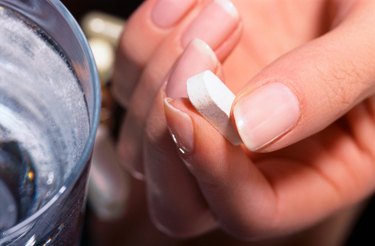
Niacin flush is caused when the capillaries become dilated and blood flow increases causing a warming sensation and reddening of the skin. This typically occurs within 20 to 30 minutes after niacin has been taken and usually only lasts a few minutes. Niacin flush diminishes naturally the longer a person takes niacin, however there are some suggested techniques to greatly reduce the frequency and severity of flushing.
Background
Video of the Day
Niacin is a B vitamin important to many processes in the body. One of its primary features is the ability to improve circulation by dilating blood vessels, making it the primary component in many medications to lower cholesterol and high triglycerides. Niacin reduces the amount of low-density lipoprotein -- "bad" cholesterol -- in the bloodstream, while increasing high-density lipoprotein -- "good" cholesterol -- levels. Niacin containing drugs reduce the risk of heart attack in patients with high cholesterol and coronary artery disease.
Video of the Day
Causes of Niacin Flush
Niacin flush occurs as the blood vessels and capillaries dilate and allow the blood to flow more freely through the body. A niacin flush is more likely with higher doses of this vitamin. Although it can be bothersome, it is actually a positive sign that the niacin is working properly. Flushing causes temporary reddening, and the skin may be warm to the touch.
Risks and Dangers
Niacin flush is a minor, non-harmful side effect and is not considered dangerous unless it is accompanied by more serious side effects such as a rash, difficulty breathing, or swelling of the face or tongue, which could indicate a severe reaction. Side effects tend to be more profound and occur more frequently when higher doses of niacin are administered, therefore most doctors will prescribe a low dose and gradually build up to higher levels if necessary. It is also important that patients not use niacin supplements to replace medications without a doctors supervision due to the higher concentration of niacin present in many supplements.
Reduction and Prevention
As the body becomes more saturated with niacin, the duration of flushes will shorten. In time, niacin flushes will occur less often or stop altogether. To help patients deal with discomfort, the manufacturers of Niaspan, a popular niacin medication, suggests several techniques to reduce niacin flush. They recommend taking a dose of aspirin (up to 325 mg) a half hour prior to taking niacin. In addition, spicy foods, hot beverages and alcohol should be avoided to reduce the likelihood of flushing. Taking niacin at night is also suggested, so that any occurrences of flushing will occur during sleep. Other brands of medication like Niacanol that promote themselves as being "flush free" are currently available, however the potential for flushing is still listed among the potential side effects.